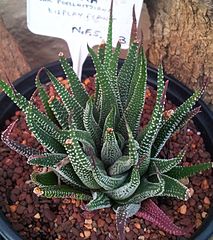Tulista minor
This article includes a list of general references, but it lacks sufficient corresponding inline citations. (October 2017) |
| Tulista minor | |
|---|---|

| |
| In habitat | |
| Scientific classification | |
| Kingdom: | Plantae |
| Clade: | Tracheophytes |
| Clade: | Angiosperms |
| Clade: | Monocots |
| Order: | Asparagales |
| Family: | Asphodelaceae |
| Subfamily: | Asphodeloideae |
| Genus: | Tulista |
| Species: | T. minor
|
| Binomial name | |
| Tulista minor (Aiton) Gideon F.Sm. & Molteno[1]
| |
| Synonyms[1] | |
| |
Tulista minor is a species of succulent plant, from the far south of the Western Cape, South Africa.
It was formerly classed in the genus Haworthia, as Haworthia minima. However this was not the correct name, as the name Haworthia minor in fact had priority. A new combination was therefore needed for Tulista minor, which was accordingly published in 2018.[1][2]
Description
[edit]It is a small evergreen succulent plant, with hard, fleshy blue-green leaves that are covered in white tubercles. It offsets readily and can form clumps.
It produces white flowers with pink tips in the summer (November to December).
It is a variable species, with different populations differing in the leaf shape, colour, growth form and tubercles. Popular varieties include T. minima var. poellnitziana, as well as the opalina and obrata varieties.
Naming and taxonomy
[edit]It was formerly placed in the genus Haworthia, along with the other large species (H. pumila, H. kingiana and H. marginata) in the Robustipedunculares subgenus. Following phylogenetic studies, it has been shown that these four species in fact constitute a distinct out-group, separate from other haworthias. They have therefore been classed as a separate genus, Tulista.[3] It was initially transferred to Tulista as Tulista minima based on Haworthia minimia. The latter is a later homonym of Haworthia minor, and in 2018 the correct combination, Tulista minor, was published.[1][4] The epithet "minor" means "small" as it is not as large as its closest relatives, such as Tulista pumila. In some old records it is also occasionally classed as Haworthia margaritifera.
Haworthia opalina has been treated as either part of Haworthia minima or, less often, as a separate species. In the second case, on transfer to Tulista, T. opalina is recognized in addition to T. minima.
-
In cultivation
-
The elongated poellnitziana form, from the far west of the species range
Distribution
[edit]The natural distribution of this species is in the far southern part of the Western Cape, South Africa. Its range extends from Botrivier and Agulhas, eastwards to Brandrivier, Herbertsdale and Hartenbos.[5]
Its habitat is usually coastal Renosterveld vegetation.
It often occurs alongside other Tulista species and is known naturally to hybridise with Tulista marginata where the two species overlap near Heidelberg.
Cultivation
[edit]It is a very easy plant in cultivation, but is nonetheless very rarely grown. It requires well-drained soil, and tolerates both semi-shade and sun. It can be grown from seed, but it offsets and subdivides naturally so it can also be propagated simply by dividing the resulting clump.
References
[edit]- ^ a b c d "Tulista minor (Aiton) Gideon F.Sm. & Molteno". Plants of the World Online. Royal Botanic Gardens, Kew. Retrieved 2023-05-08.
- ^ Tulista minor - Phytotaxa 346(2)
- ^ Manning, J.C., Boatwright, J.S., Daru, B.H., Maurin, O. and Van der Bank, M. 2014. A molecular phylogeny and generic classification of Asphodelaceae subfamily Alooideae: A final resolution of the prickly issue of polyphyly in the Alooids?. Systematic Botany 39(1):55-74.
- ^ Smith, GF; Figueiredo, E; Molteno, S. (2018) A new combination in Tulista, T. minor (Alooideae, Asphodelaceae). Phytotaxa, [S.l.], v. 346, n. 2, p. 201–202, apr. 2018. ISSN 1179-3163. Available at: <https://biotaxa.org/Phytotaxa/article/view/phytotaxa.346.2.8>. doi:https://dx.doi.org/10.11646/phytotaxa.346.2.8.
- ^ Molteno, S.; Smith, GF (2019) A significant westerly extension of the natural distribution range of Tulista minor (Aiton) Gideon F.Sm. & Molteno (Asphodelaceae: Alooideae) in the Overberg, Western Cape Province, South Africa. Bradleya, v. 37, p. 201-211, may 2019. doi:https://doi.org/10.25223/brad.n37.2019.a18.
External links
[edit]- Dressler, S.; Schmidt, M. & Zizka, G. (2014). "Haworthia minima". African plants – a Photo Guide. Frankfurt/Main: Forschungsinstitut Senckenberg.



